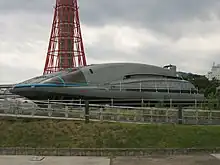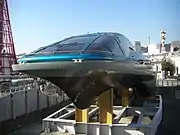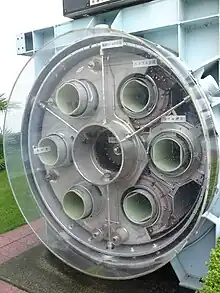Yamato 1
Yamato-1 is a ship built in the early 1990s by Mitsubishi Heavy Industries, Ltd. at Wadasaki-cho Hyogo-ku, Kobe. It uses magnetohydrodynamic drives (MHDDs) driven by liquid helium-cooled superconductors and can travel at 15 km/h (8 knots).
Yamato-1 was the first working prototype of her kind. It was completed in Japan in 1991, by the Ship & Ocean Foundation (later known as the Ocean Policy Research Foundation). The ship, which includes two magnetohydrodynamic (MHD) thrusters, which have no moving parts, was first successfully operated in Kobe harbour in June 1992.
An MHDD works by applying a magnetic field to an electrically conducting fluid. The electrically conducting fluid used in the MHD thrusters of Yamato-1 is seawater.
In the 1990s, Mitsubishi built several prototypes of ships propelled by MHDD systems. Despite projected higher speeds, these ships were only able to reach speeds of 15 km/h.
Afterwards, Yamato-1 was on display at the Kobe Maritime Museum, but it was demolished in 2016.[1][2]
 Yamato-1 on display in Kobe, Japan
Yamato-1 on display in Kobe, Japan The front of Yamato-1
The front of Yamato-1 A MHD thruster from the boat, at the Ship Science Museum in Tokyo
A MHD thruster from the boat, at the Ship Science Museum in Tokyo View of one end of the magnetohydrodynamic drive fitted to the vessel
View of one end of the magnetohydrodynamic drive fitted to the vessel Yamato-1 in front of the Kobe Maritime Museum
Yamato-1 in front of the Kobe Maritime Museum
Further reading
- Yohei Sasakawa: Yamato-1 - the world's first superconducting MHD propulsion ship. Ship & Ocean Foundation, Tokyo 1997, ISBN 4-916148-02-9
References
- "神戸港ランドマーク ヤマト1と疾風、廃棄処分へ". Kobe ShimbunNEXT. October 15, 2016. Archived from the original on February 21, 2017. Retrieved February 21, 2017.
- "神戸港の実験船、撤去開始 メリケンパーク再整備". Kobe Shimbun NEXT. November 8, 2016. Archived from the original on February 21, 2017. Retrieved February 21, 2017.
External links
- Magnetohydrodynamic and the Mitsubishi Yamato
- Popular Science November 1992 Superconductivity Goes To Sea
- Popular Mechanics August 1990 100 MPH Jet Ships
- Ship Sails on High-Tech, `Silent' Drive The Washington Post, June 17, 1992;
- Japanese Ship's Magnetic Attraction; Revolutionary Drive Design Lacks Moving Parts The Washington Post, June 22, 1992